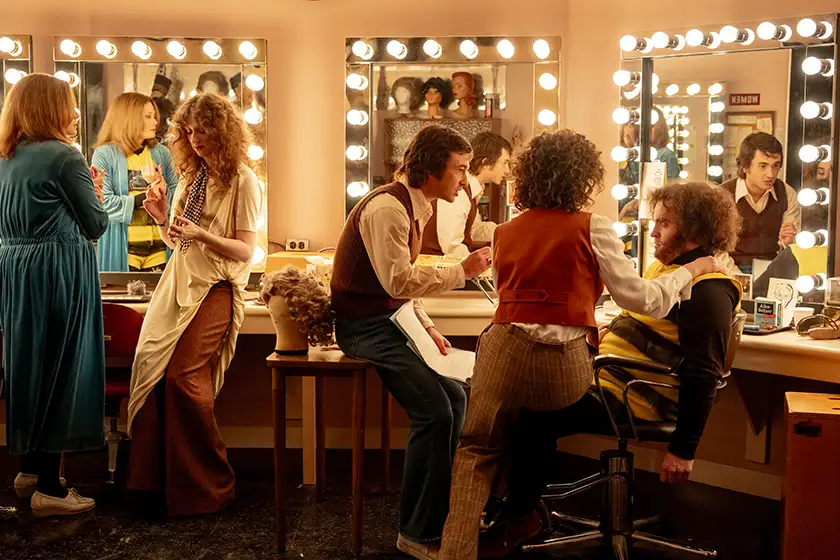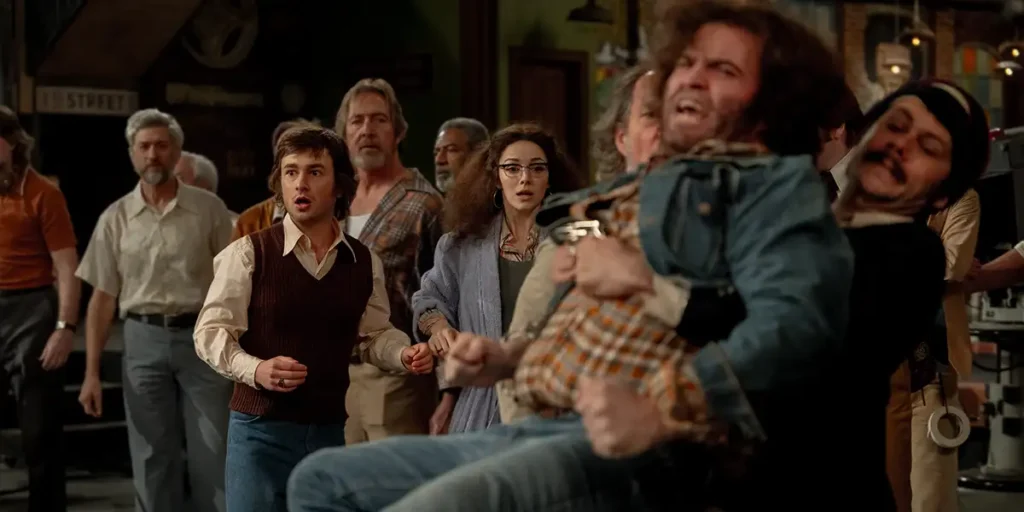While Jason Reitman’s depiction of the first airing of Saturday Night Live contains numerous issues, it’s anchored by two towering turns from Gabriel LaBelle and Cooper Hoffman.
Director: Jason Reitman
Genre: Biographical, Comedy, History, Drama
Run Time: 109′
US Release: October 11, 2024
UK Release: January 31, 2025
Where to watch: in theaters
In the tradition of John Cassavetes (or, more recently, Josh and Benny Safdie), Jason Reitman represents the first taping of Lorne Michaels’ (played by Gabriel LaBelle, of The Fabelmans) Saturday Night Live as a night of total chaos. Everything that goes wrong absolutely goes wrong, and one wonders if this aspiring 31-year-old showrunner is way over his head.
He may very well be, especially considering that he can’t keep his cast, comprised of up-and-coming talents such as Chevy Chase (Cory Michael Smith, of May December), Dan Aykroyd (Dylan O’Brien, of The Maze Runner), Gilda Radner (Ella Hunt, of Horizon: An American Saga), John Belushi (Matt Wood, of Sunset Park), Jane Curtin (Kim Matula, of Fighting with My Family), Garrett Morris (Lamorne Morris, of How It Ends), Andy Kaufman and Jim Henson (both played by Nicholas Braun, of Succession), in check.
Careening around inside 30 Rockefeller Plaza with NBC’s director of weekend late-night programming Dick Ebersol (Cooper Hoffman, of Licorice Pizza), Michaels’ goal is to ensure they make it to air, no matter what. But he can’t sign John Belushi’s contract, none of the actors are on the same page with each other, a censor is on track to remove most of its jokes, and, worse of all, NBC’s David Tebet (Willem Dafoe, of Kinds of Kindness) could pull the late night variety show before it has a chance of airing, ready to air a rerun of The Tonight Show with Johnny Carson, the most-watched late-night program at the time, if necessary (it’s interesting how Carson is developed as a villain here, even though he’s one of the most revered figures in television history).
Cinematographer Eric Steelberg shoots the film with impeccable verve in 16mm, and Reitman puts the audience at the front and center of this disorganized evening. With whip-pans aplenty meant to represent the continuous turmoil of a set crumbling in front of Michaels’ very eyes (which widen in pure shock during a bravura close-up of his face just as the show’s about to begin), the audience feels the incessant anxiety within the studio, wondering exactly how they will ever make this show the success it now is as a staple of late-night entertainment.
Exacerbated by sharp cuts from editors Nathan Orloff and Shane Reid, juxtaposing the mounting pressure Michaels feels on his shoulders by fragments of previous catastrophic events that have pumped up his heartbeat in dangerous territories, the aesthetic construction of Reitman’s Saturday Night is purposefully chaotic.

From the moment it opens, characters talk over each other in barely perceptible confrontations, the sound design is constantly unnerving, and Jon Batiste’s ticking clock-driven score (which acts as the primary musical leitmotiv) never lets up, even in what could be considered moments of respite. The clock is literally and figuratively ticking, and Michaels knows he does not have the time to make the show as perfect as he envisioned it in his head but absolutely wants to.
Representing this vivacious fervor of a young, dynamic showrunner desperate to impress America and possibly the world with what he calls a “revolution,” LaBelle proves that he wasn’t simply a one-hit wonder with Steven Spielberg, but a once-in-a-generation talent poised to be one of our most treasured presences on the big screen.
No young actor who made their debut since the 2010s possesses the qualities he has here. He’s not only perfectly in sync with Steelberg’s constantly moving camera (side note: career-best work from someone who’s been collaborating with Jason Reitman for more than twenty-five years) but with Reitman and Gil Kenan’s script that puts him as the center of attention of each scene. He deftly represents the larger-than-life aspirations of someone in a state of pure delusion. Even if Ebersol attempts to bring him back to reality and tell him what will likely happen, Michaels believes this show is far too big to fail and could make history. His determination and desire for success compels us to watch this film to the very end.
Hoffman is also excellent as Ebersol, but it felt a tad frightening how much you can see a young Phillip S. Hoffman, who broke out with turns in Scent of a Woman, Twister, and Boogie Nights and became one of Hollywood’s greatest actors to have ever graced a screen. His incredibly contagious energy in each of the roles he depicted is deeply felt inside his son’s portrayal of one of NBC’s most influential television executives, who took a massive risk in giving Michaels (almost) complete creative control in his vision for Saturday Night Live. At the time, it would either be a revolutionary success or a cataclysmic trainwreck. There was no in-between.
And yet, with so much technical prowess in the camera and editing department, alongside two rock-solid emotional anchors in LaBelle and Hoffman, there’s so much wrong here. For once, so many supporting actors playing some of Saturday Night Live’s most influential figures are woefully miscast and parody the icons they’re bringing to life instead of celebrating them. Nicholas Braun gives not one but two abysmal performances as both Kaufman and Henson, fundamentally misunderstanding the two and using their legendary status as punchlines, as opposed to treating them with the reverence they deserve.
In fact, the only character that doesn’t seem to be treated as a complete buffoon is Chevy Chase, because Cory Michael Smith seems to be the only actor who understands that, even if the situation itself is constantly disorganized, none of these people are cartoons.
They’re fundamentally human and must be portrayed with a minimum of respect. The May December actor not only has the correct intonation and understanding of Chase’s sense of humor but gives much-needed emotional texture to a comedian primed for his career to go big in ways he may not fully expect.
The same can’t be said for how Reitman and Kenan appallingly depict John Belushi and George Carlin (played here by Matthew Rhys, of Cocaine Bear), making their well-publicized drug addiction as a comedic subplot instead of the self-destructive cause of their respective, tragic deaths. It reaches levels of disrespect that I never thought possible from Reitman, especially from someone who, every time you hear him speak, has a deep love for the people who brought Saturday Night Live to life. Some could say this was expected after CGI Harold Ramis in Reitman’s previous film, Ghostbusters: Afterlife, which was incredibly despicable in so many ways. Still, it does not even reach the line he crosses in Saturday Night’s depiction of two comedic legends whose unfortunate battles with drug addiction sadly took the better of them.
Worse yet, Reitman and Kenan completely shun the female players who had a part to play in Saturday Night Live’s success. This is true for all of the stars they showcase in the movie, who barely have anything to do or say (it’s almost as if the two writers said Gilda Radner? Jane Curtin? Who are they?), but also for Lorne’s wife, Rosie Shuster (played by Rachel Sennott, of Bottoms).
You’d almost be forgiven to think she was a background character with little to no agency or importance in the story. But she was as important to Saturday Night Live’s longstanding reputation as her husband was and wrote many of the show’s memorable sketches in its early days. Of course, Sennott tries her best, but she can’t do Rosie justice with the minimally developed character she has to work with. In the film, Rosie always lives in the shadow of Lorne, while the actual story is far more nuanced than what is shown in Reitman’s mind.
Perhaps this feels expected when you write Saturday Night as a vehicle to worship the madcap genius of Lorne Michaels. And it’s probably why LaBelle truly holds this movie together, as much as Michaels wanted to hold as much as possible to prevent the show from falling apart before it aired. But in doing so, Reitman seems uninterested in anything else and would instead turn most of his (miscast) supporting characters as references and parodies instead of treating them seriously, with the esteem they deserve. As a result, its chaotic structure can only go so far before we begin to think of how reprehensible and insidious this entire film could be…
Saturday Night will be released in US and Canadian theaters on October 11, 2024 and in UK and Irish cinemas on January 31, 2025.

